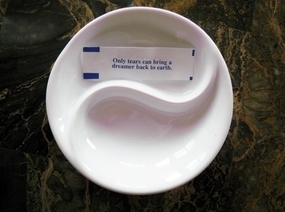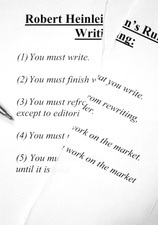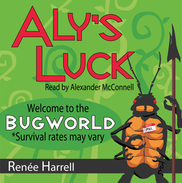Renée Harrell's Blog, page 11
April 9, 2013
Steve is on the job...
 ...even if we're not.
...even if we're not. Instead of prepping our post for today, we spent yesterday traveling. A beloved family member has recently passed away and, while we couldn't be at the memorial, we could be with Renée's Mom while the service was being held. Family clings to family in sad times and we were clinging.
It was a wonderful time to be together but it meant we had to travel a lot of miles in a very short time. The trip back wasn't easy. If there was a High Wind Advisory, we missed it but the winds were fierce. When the traffic in front of us started braking abruptly, we knew something was wrong.
A minute later, we were creeping past an overturned tractor trailer. From what we could see, it had blown over. There are some days when owning a small car is not a bad thing.
You'll notice we failed to get a picture of the big rig. Caught off-guard, we never thought to reach for a cell phone. No, we only remembered to use our cell's camera after we stopped at a gas station in the middle of the desert. In the center of abso-frickin'-nowhere. The image on the left is what resulted.
In the Men's Bathroom, Harrell found this sign taped over the urinal: OUT OF ORDER DO NOT USE. In case this wasn't quite clear enough, the staff had helpfully added, That means no p*ssing in here.
And -- here's the part that caused the photo to be snapped -- below that, just letting the management know he, personally, had received the message, one of their patrons wrote in, OK, before signing it... Steve. So, if anyone does ignore the warning, we can pretty well be assured it isn't Steve.
Somehow all of the above resulted in our finding an article in Business Insider called I Used the Worst Men's Bathroom in America. And we're sharing it with you.
Published on April 09, 2013 06:07
April 2, 2013
Sometimes you catch the shark...
 ...and sometimes the shark catches you. That's the secret subtext in Dean Koontz' How to Write Best Selling Fiction (his possibly outdated instruction manual, since it was published 30+ years ago and is currently out-of-print. That's okay, we're going to share the skinny with you before this post is over).
...and sometimes the shark catches you. That's the secret subtext in Dean Koontz' How to Write Best Selling Fiction (his possibly outdated instruction manual, since it was published 30+ years ago and is currently out-of-print. That's okay, we're going to share the skinny with you before this post is over).Although it could be that there isn't any secret subtext in the Koontz' book and we just wanted an excuse to post this photo.
Courtesy of Mr. Koontz and his , we learned that a writer has to plant his or her butt in the chair and actually write. This is the part of the process we struggle with; it's much more fun to plant our widening butts in the chair and eat cheesecake. Even though DK's success rings the register at 25 million dollars a year (or more), he still puts in the hours. Presumably a centimillionaire, he's at the word processor daily, making magic.
We have considerably fewer financial resources than him. However, we're willing to bet that we've eaten considerably more cheesecake than this wealthy, wealthy man. We also suspect, when he's in the twilight of his career and richer than Midas, he'll still be at the word processor, writing his next novel. As he shouts at Gerda to bring him his Malt-O-Meal, we'll be at the Cheesecake Factory, enjoying a slice of their GODIVA® Chocolate Cheesecake.
Truly, at that moment, who will be the richer?
You'd be mistaken to think the Best Selling Fiction book didn't offer more advice and in an entertaining fashion. From the start, we learned we needed to put care and craftsmanship into our work. We were advised to remain humble -- we're, like, the best writers ever at being humble -- and we were admonished to concentrate on our storytelling. Also, DK believes that all writers should be open to change.
So far, so good. Nothing startling but some solid advice. We soon discovered that writers need to “read, read, read” as well as “write, write, write”. We found out that exotic titles can excite the imagination and that a strong title is a good thing. We were not surprised to discover that the plot of a story is important and we were not shocked to learn that it's a good trick to catch a reader’s attention from the get-go.
Again, there was nothing wrong with any of this...but nothing that shouted "This is it! This is how you move up to Best Seller!", either. Since so much of what we read just seemed to be basic, common sense, we wondered if people maybe didn’t know this stuff back in 1981. Was there a school of thought that suggested that writers shouldn’t read or that most novels didn’t require a plot? Was there a famous writing instructor who insisted, adamantly, that no one cared about titles or that it was an amateur move to grab a reader’s interest?
We also wondered if we should have used this space to suggest that it was going to be easy to write a best selling novel. A bit impatiently, we started skimming through the book. There was more advice to follow.
Put action in your book? Yes! Too much action? No! Create believable characters? Check! (Also, the hero needs to be kind to animals and brush his/her teeth regularly. Not kidding.) The villain's motivation? It needs to make sense. The hero's motivation? It needs to make sense.
Do some research. Punctuate properly. Put a little style in your writing. Oh, and science fiction and mystery are “literary ghettos” but some writers can still make a buck if they enter the ghetto cautiously.
Toward the end of the thing, DK goes into contracts and advances and agents. Some of the info is understandably dated and some of it is simply depressing. For instance, the book advance he quotes for a new writer is still accurate today. Throughout the book, he samples freely from his own work, he provides his thoughts on other writers (he likes Stephen King but King failed to end THE STAND properly; he likes Ken Follett but Follett did lazy plotting on THE KEY TO REBECCA ), and, at the end of the day, we feel that his advice is certainly worth more than the money we spent on the book.
But we still hadn’t found the key that would turn our next project into a Big Money Success. Nor will we. In zipping through the incidentals, we missed this: “I cannot give you a magic formula that will guarantee you success as a novelist.”
Ah. Well, yes. Of course. It all goes back to giving your book a good title, doesn't it? How to Write a Decent Novel That Might Someday Sell Well wouldn't exactly grab the crowd now, would it?
It would still be worth our twenty-five cents, though.
Published on April 02, 2013 06:18
March 26, 2013
We need a cookie...
 ...'cause today is being devoted to a long road trip. Never you mind why we're traveling on this Tuesday (it's medical but not scary, meaning the hours will pass slowly, but the day will be broken up by new and various bookstores so it's not all bad), just know that we're putting rubber on the road. Which means that this post is going to be a teensy bit abbreviated because we didn't think to get it written earlier.
...'cause today is being devoted to a long road trip. Never you mind why we're traveling on this Tuesday (it's medical but not scary, meaning the hours will pass slowly, but the day will be broken up by new and various bookstores so it's not all bad), just know that we're putting rubber on the road. Which means that this post is going to be a teensy bit abbreviated because we didn't think to get it written earlier.If you'll remember, we were about to share the secrets behind writing a best-selling novel. They weren't our secrets, though. These tips come from the giant brain known as Dean Koontz. And he should know how to write a best-selling novel since he's written so many of them.
Random interruption here: Did you know that Amazon has a list of their top 100-selling authors? Yes, you probably did, you probably go -- here -- all the time, but it was new to us. Going over the list, we see that DK is currently clocking in at #63, which seems a little low to us. James Patterson is #1 in the rankings (not in our house, no, but we've only read part of one of his books and we're not even sure he wrote it. It was credited to JAMES PATTERSON and Maxine Paetro and it was a big best-seller. The novel might have gotten better and better as it went along but we bailed at Chapter Five and never looked back). Stephen King is #23 -- we love us some King -- with J.D. Robb at #25, and considering how many J.D. Robb books we're seeing lately, we'd have thought she'd have cracked the Top Ten easily.
End of random interruption.
Before we were going to share Dean's secrets, we needed to know if the book was still in print. It isn't but, if you have a spare C-note, you'll find copies -- here -- and on Amazon. Even though we spent much less on our volume (25¢), at least your hardback will come with a only slightly torn dust jacket.
We wish ours had a dust jacket. We'd be eBaying the thing tomorrow.
Since it's jacket-less, and since our friends are generally fairly broke, we'll share a chunk of its wisdom with you. Even though it was written in 1981, it's still filled with some strong advice. To begin with, remember when we ranted that a writer could be fast or good but shouldn't count on being fast and good? As it turns out, that's just us. During his six years as a full-time novelist, Dean wrote quickly in an attempt to establish a sound financial base. He wrote bunches of everything, including porn. Sitting at the typewriter each and every day of the week, he was able to produce a series of Gothic romance novels. Each one took him about a week.
A week!
It took us three months to do a Young Adult work-for-hire manuscript that was, we'd guess, at least 10,000 words shorter. Young Dean was a stud. He wasn't the only one, though. With a little bit of investigation, we discovered that Edgar Rice Burroughs wrote 413,000 words of published fiction in 1913 alone. John D. MacDonald, one of Harrell's favorite authors, said he completed 800,000 words of "typed manuscript" in FOUR MONTHS.
He tapped out more words than many writers will produce in their entire lives. How did he do it? "I worked twelve and fourteen hours a day, seven days a week." (This from Maybe You Should Write a Book by Ralph Daigh, also out-of-print and currently available, used, for a penny. Worth it, too.)
The takeaway from today's "How to write a best-seller" workshop? Put butt in chair. Keep it there and work. Hit the keys until your fingers bleed.
We never said it would be easy. (Well, yes, last week we said it would be easy. You can't live in the past.)
Quote for the day: “I think it is important to have goals in life, as long as you understand that achieving those goals will not make you happy” – Joe Queenan
Published on March 26, 2013 19:53
March 19, 2013
Not only are we going to write a best-selling novel...
 …but we’re thinking you should, too. It’s going to be easy.
…but we’re thinking you should, too. It’s going to be easy. The idea came to us while Harrell was flipping through some old magazines. He came across a 30 year old interview with a writer he enjoys. For some reason not yet clear to anyone, he decided he needed to read that interview. Even though, again, the magazine was 30 years old.
Even though Harrell had promised to spend the afternoon working on the back yard watering system.
It is FINALLY less cold in Northern AZ.
In the ancient interview, the writer declared that he was ready to sit down and make some serious money. Name Withheld said, "Every asshole who reads under a hairdryer or while sitting with a can of beer in his hand is going to be buying and reading the book that I will be writing, the novel that I'm writing, and that will be top of the bestseller list. I promise you. Number one bestseller in the nation."
He felt he could write his bestseller in a couple of years. This sparked our attention.
(If you happened to have read the interview, once upon a time, feel free to fill in the Name Withheld part. We’re not comfortable doing it here. If you haven't read the interview, just know that Name Withheld is a writer of some repute. He is unquestionably gifted and his stories are award-winning. That’s the good news. That bad news is, NW is reputed to be touchy as hell and happy to initiate a lawsuit at the drop of a hat. We’re hoping not to be sued this year. At least, not until after we’ve written our best-seller and can afford a really good attorney.)
NW clearly thought it wasn’t much of a challenge for someone to climb the bestseller’s list. And NW should know. He’s still in the writing game, he's been there for a long, long time and he knows the ins and outs of the publishing biz. As far as we know, he never actually got around to creating his #1 smash hit novel but we’re sure there’s a good reason why he didn't.
Maybe he was spending too much time in court.
Respecting NW’s expertise, we wondered if someone could decide to just sit down and write a #1 bestselling novel. After all, when it comes to writing popular fiction, how hard can it be? Novice author E. L. James came out of the gate with three huge #1 hits. Financially, it worked out very nicely for her. At one point, she was reported to be making over a million dollars a week from her work.
For had that kind of coin, we decided we should write one, too.
Now, our beautiful daughter had already provided us with the template for writing success – Rachel’s Rules and Regs of Writing a Successful Romance – but we’ve tried that. Yes, we did. While you assumed we were lying around the house, one of us recuperating from surgery and the other one failing to fix the backyard water system, we were also writing.
So far, our new book’s sales have failed to soar into the six and seven digits. Or the five digits. Which makes sense, considering that it came out a heart beat ago, but the audience's immediate response leaves us wondering if we’ve truly written America’s Next Literary Obsession. We doubt it and, consequently, we’re doubting Rachel’s Rules. You may be asking, Did we follow the instructions exactly as given? Good question. We didn’t follow every single little tiny syllable, no, but basically we followed them. Yeah.
Since our newest work doesn't appear destined for the New York Times Bestseller list, we've decided we’ll look for inspiration elsewhere. Three days ago, we found our inspiration at a used book sale. We located our very own hardcover guide to fame and fortune and it only cost us twenty-five cents.
Half of Team Turner believed we should put the book aside while fixing the water system while the other one knew we needed to focus on the 304 pages of brilliant advice in front of us. If you’d like to know which one of us won the argument, here’s a hint: the shrubs in back are turning brown.
Wander this way next week and we’ll reveal all. Or, at least, a little more.
Published on March 19, 2013 05:43
March 12, 2013
If you've ever read The Princess Bride...
 …by William Goldman, then you’ve probably discovered a few things about the book. You’ve learned that it’s a delightful read, everyone loves the story, and the cover image on the left has nothing to do with the novel. At all.
…by William Goldman, then you’ve probably discovered a few things about the book. You’ve learned that it’s a delightful read, everyone loves the story, and the cover image on the left has nothing to do with the novel. At all.Even if the cover makes no sense, this is the face of the paperback that Harrell has owned for years. With the cover starting to separate from the spine, he thought it was time to replace it and with a lookalike if possible. When he went looking for the same edition, he discovered that his little paperback is now a collector’s item, runs in the $150+ range, and it was time to look for something a little cheaper.
So he decided to do a little on-line shopping. Which is when he discovered, to his surprise, that not EVERYONE loves The Princess Bride.
(From Amazon.com – as are all of the reviews we mention here) " Why can’t you rate something 0 stars? This book not only deserves 0 stars...IT DESERVES NEGATIVE INFINITY STARS! This book is the absolute worst book I have ever read!"
Now, we’ve had our share of bad reviews but we’ve never been told we deserve negative infinity stars. That’s a lot of stars. And this was for a novel that is…well, not universally beloved, apparently, but largely considered one of the highlights of Bill Goldman’s award-winning writing career.
The review made Harrell laugh because it was so over the top. It also made him curious if there’d been any negative response to his favorite Stephen King novel, Salem’s Lot:
"I had nothing to do so I read this book. Man! was it boring. No interesting characters. Didnt really scare me a bit. Boring plot. Man! "
Man! That’s one unhappy reader! Man!
Again, Harrell laughed…and why not? Both of these novels have been received with joy; they’ve each received hundreds of positive reviews on Amazon and the negative comments are definitely few and far-between. But now it was a game and he began to look for one- star reviews of some of our favorite books.
**For fun’s sake, we’re only taking a small portion of each review but we are quoting the reviews exactly as written. The bolded sections are bolded on Amazon**
" Garbage and pseudo-scientific gobbledly-gook I decided that I would finish this book, even though I knew at about the half-way point, I would have to dispose of it so that at least there would be one fewer copy on the face of the earth when I was done." (Relic by Douglas Preston and Lincoln Child)
We love the idea that the reader hates this book so much that s/he’s going to destroy it – but only after reading the entire thing.
" read my rewiew for this horrible book This was the worst book I ever read. It was dragged out 249 pages longer than it need to be. Get as far away from this book as possible." (Murder on the Orient Express by Agatha Christie)
This edition of Murder was 336 pages long.
" Do not read this book It is sooo bad. It goes from bad to worse, and then it gets really bad. I am not a person who will write reviews, but I wish someone had steered me clear of this one." (Midnight by Dean Koontz)
So it starts at “bad”….
Couldn't wait for it to be over With some decent editing this could have been a half way decent book. As it stands it is interminable. Unless you can suspend disbelief to the point of self-hypnosis, then give it a wide berth. (Ghost Story by Peter Straub)
Finally, a review that places the blame where it belongs: on the editor.
" An awful book that should get 0 or less stars This is just a horrible book. My school is forcing me to read it. It is just so boreing. I don't even think my teacher can take it anymore beacause we have been reading it for 3 monthes and we only got up to chapter 10. You see, we have to read it outloud in class. I dought we will ever finish this horrible book. Spend your money on Harry Potter instead." (The Hobbit by J. R. R. Tolkien)
…and speaking of the first Harry Potter novel:
"this book is probably the worst book i will ever read!!!!!!!!!!!!!!!!!!!!!!!!!!!!! it took me weeks to finish this book. the words are to small and the is as thick as my head. this book is for people with bad taste in books." (Harry Potter and the Sorcerer’s Stone by J.K. Rowling)
It’s all the exclamation marks that we love.
That review led us to wonder if anyone had a story that hadn’t been slammed. Then we thought of our kids and how much they’d enjoyed Dr. Seuss and One Fish Two Fish Red Fish Blue Fish. No one could possibly object to that simple and delightful little book, could they?
" Oh Puh-lease! It is like this book was written for a baby or something. Anybody looking for enlightened literature should look elsewhere."
We desperately want to add those last words to our website. "Mars Needs Writers.com Anybody looking for enlightened literature should look elsewhere."
So, when you get your next bad review, just remember: you can completely ignore it unless it includes negative infinity stars.
Published on March 12, 2013 04:44
March 5, 2013
Until we opened this fortune cookie...
 ...we thought things had been going pretty good. Couldn't exactly say why, since this last week hasn't been particularly stellar. One of us had a (sudden, unexpected) trip to the doctor's office, while the other had a (sudden, unexpected) visit to the dental office. When we brought the car into the repair shop (scheduled), the bill ran $200+ over the (expected) total. Yet, for some reason, we were feeling vaguely optimistic.
...we thought things had been going pretty good. Couldn't exactly say why, since this last week hasn't been particularly stellar. One of us had a (sudden, unexpected) trip to the doctor's office, while the other had a (sudden, unexpected) visit to the dental office. When we brought the car into the repair shop (scheduled), the bill ran $200+ over the (expected) total. Yet, for some reason, we were feeling vaguely optimistic.Then, when we grabbed some quick Chinese take-out, we opened the first of our fortune cookies and we read -- Only tears can bring a dreamer back to earth.
It bugged us. We'd expected the cookie to contain some vague bit of nothing -- A man who embraces happiness is a happy man -- because that type of inspirational blather seems to be the norm these days. It never offends the customers.
Our cookie, though, decided to get down to business. It was not only telling us about the future, it was warning us. We only wish we knew what it meant.
Is there some way to spin these words into a positive inspirational message? Not that we can see.
That will teach us to go around, having dreams. Once life kicks in, those sobs will start coming and we'll finally see existence for the giant suck hole it is. And we've got some family members think, it's about time.
Around the same time, as if to prove that life is a giant suck hole, a friend sent us an e-mail, warning us about Amazon's new Paperwhite reading device. She wrote, "I've heard that MS Word files aren't formatting correctly. You may need to reinstall your files using some other program or people won't be able to read your stuff."
Well, damn. (And double damn because, if you're not interested in formatting e-novels, the rest of this info is kind of boring. So, thanks for dropping by, we hope we'll see you next week, say hi to the cousins for us, okay?)
We didn't have a Kindle Paperwhite to try so we started contacting other writers in the area. Somebody else said our friend was wrong, a couple of somebodies said she was right, and everyone seemed to want to use a different program for their manuscripts. One person used OpenOffice (free), another used MobiPocket (also free), others used Calibre (free) or Scrivener ($40 but there's a free trial) some used Sigil (free...I think) and one guy insisted, "Like it or not, you've got to learn some html" which would be free except for the terribleness of having to study html.
Instead, we dropped $27, and bought 100 downloads of the Kinstant Formatter. $27 was a bargain if the program was as dead simple as advertised. The way it's supposed to work, you pays your money, you load your MS Word document (.doc, .docx or .odt) and your cover image into the Formatter, and you're done. Plus, the Formatter group promised: "Future-proof all of your books… do the work ONCE and only ONLY… because KinstantFormatter is using the ONLY tool Amazon has promised will work indefinitely." (This is a direct quote. So they're not not advertising copywriters, okay? Give 'em a break.)
It's hard to believe Amazon has promised to make the little-known Kinstant Formatter their prime formatting tool in the future but the K.I. people had never lied to us before so...
We plugged in our re-edited Aly's Luck. The manuscript downloaded quickly. We filled in the cover (which can be up to 5 MB but ours wasn't anything that large). Piece of cake. We put in the book title and author's name, as required, and looked at the advanced options:
Add/Replace TOC
Remove tabs
Remove line breaks
Remove blank lines
Try to improve bullet points
Resize images
Compress jpeg images
Force alignment
-- which only confused us but, happily, the K.I. people had selected some of the options for us. They also provided an instant "document analysis", revealing:
Didn't find a table of contentsCan't build a TOC - no Headings foundTabs found: 1Line breaks found: 2Blank lines found: 5
-- even if they didn't tell us why any of this mattered. Ignoring their analysis (because we didn't know what to do about it) we pushed the GENERATE Kindle epub button and, bingo!, our revised Aly was ready for our inspection. Except we couldn't read it because we hadn't downloaded Adobe Digital Editions (free), so we did that. It still didn't work. We then downloaded the Kindle Previewer, to see if that might fix the problem, and it wouldn't read it, either.
Over the next few hours, we worked with the K.I. customer service people to fix the problem. They were quick and responsive but they seemed as stumped as we were. Each time we tried to fix something, we used another of our 100 downloads. Use enough of those puppies and you'll need to dig out another $27.
Finally, we solved the problem. The people who understand nothing about computers.
I know. Incredible.
As it turns out, the Kindle Previewer settings have to be manually adjusted for Windows 7/Vista 32 or it can't read the books created by the Formatter. Since our computer runs Windows 7, it created a problem. (If you're having this problem, Amazon says, "Set the compatibility mode for Kindle Previewer to Windows XP SP3 so that it launches correctly. To set the compatibility mode, please locate the Kindle Previewer shortcut in your Start Menu. Right click on it and click on Properties. In the Compatibility tab, click on the check box labeled Run this program in compatibility mode for: and select Windows XP (Service Pack 3)" from the drop down list.) Oddly, the customer service people didn't have a clue about this but they tried to help us, and tried hard, so we forgive them.
After we adjusted settings, everything went smoothly. The reformatted Luck is now up on Amazon and The Atheist's Daughter is currently undergoing its review. Unless something changes, we're once again feeling happy and optimistic.
And our fortune cookie writer can go bite himself.
**One more note! Cassandra Parkin is having a birthday this week. We love Cassandra Parkin, she's a wonderful writer, and we think her New World Fairy Tales is just terrific. We're not suggesting you should download it but you'll be pleased if you do. Happy birthday, C.P.!**
Published on March 05, 2013 04:09
February 26, 2013
We've never been to Honduras...
 ...and we're betting that these three men have never been to our part of Arizona. Still, as of now, we have a tenuous relationship. And it all started with the legume.
...and we're betting that these three men have never been to our part of Arizona. Still, as of now, we have a tenuous relationship. And it all started with the legume.The guy on the far left, the one who looks like he really, really doesn't want to be there? That's Anselmo. According to Kiva, "Anselmo is an honest, responsible and hard-working person", and Anselmo is in the business of buying and selling peanuts. He uses his peanut-profits to care for his three children in Choluteca, Honduras.
Not coincidentally, Harrell loves peanuts. In that way, he is much like George Washington Carver, except that GWC spent the last two decades of his life promoting peanuts and racial harmony, whereas Harrell has mostly spent the last two decades of his life, just eating peanuts.
Harrell has done a few other things -- get married, make babies, write, build a life -- but he has devoted a significant portion of the last 20 years to eating peanuts. Oh, and he's in favor of racial harmony.
So, when we decided to make a new Kiva loan, he wanted to focus on someone male (this will be our eighth and we are gender-unbalanced, according to our Kiva portfolio), someone who was smiling (many of the Kiva recipients are sour-faced), and someone working in peanuts. It took some searching and we had to abandon the "smiling" requirement, but we finally found Anselmo and the G.s. Guasaule N #5 Group.
 In order to lend our cash to the peanut vendor, we had to offer a loan to his compatriots as well. The guy in the middle, the one who looks like he's ready to run? That's Walter. He could, presumably, care less about peanuts. He's in the business of buying and selling seeds.
In order to lend our cash to the peanut vendor, we had to offer a loan to his compatriots as well. The guy in the middle, the one who looks like he's ready to run? That's Walter. He could, presumably, care less about peanuts. He's in the business of buying and selling seeds.The fellow in the far right? He's Angel. Angel buys and sells chickens. Just by looking at him, you have to doubt if he's a peanut lover.
Working as a group, each man receives an individual loan but all three of them provide support to one another. There's also a little peer pressure going -- "Hey, Anselmo, you pay off your Kiva loan yet?" "Walter, not yet. What do you want? I'm working for peanuts!" -- but, at the end of the day, they're on their own. We hope they do well. We only wish at least one of them looked happy in the photo.
Quote of the day: "Success is for creeps. We already reward narcissism way too much in our culture, so what I’m going to tell you guys is, do what makes you happy and be nice."
-- Bobcat Goldthwait
Published on February 26, 2013 09:48
February 19, 2013
We don't dare look back...
 ...because everybody is gaining on us.
...because everybody is gaining on us.(The picture on the left? It's supposed to snow tonight. Then snow some more tomorrow. We're tired of snow.)
Following last week’s blog, we received a couple of emails – y’know, you don’t have to write, it’s okay to use the Comments Section on this thing – and we scored about 50/50 in that limited response. One person agreed with us and, we’re pleased to say, she’s absolutely right to do so. The other person disagreed just in general, believing Robert Heinlein > Renée Harrell, and also believing that only weak writers do a rewrite of their work. Arguing that speed triumphs persnickety-ism and leaves the material fresh and exciting. In so many words, the Other Person told us, it’s better to get your work out in the marketplace and fast, rather than spend hours doing rewrites and editorial changes. More product = more sales and more sales = more royalties.
Continuing to follow that line of reasoning, more royalties = a bigger bank account,
a bigger bank account = financial opportunities never before explored,
financial opportunities never before explored = an appointment with the plastic surgeon,
plastic surgery = no more wrinkles,
no more wrinkles = younger boyfriend,
younger, hot, loves-you-only-for-your-royalties fab-tastic boyfriend = no more sour-faced Harrell in the morning,
no more sour-faced Harrell in the morning = well, nothing good for Harrell, I’ll tell you that.
We responded that quality will out (Harrell was stating this vehemently), but our new friend had a compelling argument against our theory. O.P. directed us toward another writer, one that produces a new 300-page novel about eight times a year. We're lucky to put out one piece a year.
So we scurried over to the writer’s blogsite (which is very nicely laid out, and much more interesting than what we offer here – so, fat chance we’ll give you a link) and, yes, this guy is doing well. In terms of sales, every single one of his novels is ranked above anything we have on Amazon. Looking at his publication dates, and reading his comments, he’s popping out a new manuscript every six weeks or so.
He’s doing well and one of us is jealous. (No, not that one. The other one.) Since our new literary hero had recently put out a new book – great covers, too, did we mention this? – we downloaded a sample. The first chapter wasn’t bad. It had a great hook, the characterization was interesting, the dialogue...okay, so maybe it wasn’t all perfect. The dialogue went along something like this:
Detective Oates turned to look at me. “I don’t care what you think. You’re not safe.”
“I have a gun,” I told him.
“And you think that will help? A gun? This creature can’t be stopped by bullets.”
“What do you mean, this creature?”
“It’s not human.”
“Not human?”
“Bullets bounce off of it. It’s skin is like metal.”
“Like metal?”
“And it’s super fast. Super strong.”
“Super strong?”
“And it lives on blood. Human blood.”
I felt faint. “Human blood?”
“And it’s name is Joey Joe-Joe Junior Shabadoo.....”
The name thing? Not in there at all. Damn, we used to love The Simpsons.
But, in our brief view of the master’s manuscript, we couldn't ignore the long stretch of dialogue where the lead character tended to repeat whatever was said to him. It went on for almost two Kindle pages, which probably equals one full page of a paperback book. After a very short while, this became distracting. Throughout the sample, we also found many too many sentences starting with “And”...as in, And this is a first draft and I don’t have time to get this thing edited.
Still, there’s no arguing with Amazon rankings. (Or reviews. The people that like this kind of thing, really like it. Or hate it: the one-star reviews seemed astonished that anyone else was on board this train.) Clearly, if we want to be mega bucks successful, we need a new approach to our writing.
We're just trying to decide if the mega bucks would be worth it.
Published on February 19, 2013 10:20
February 12, 2013
Rewriting the rules...
 ...isn't really what we do. We tend to be rule-followers, rather than rule-rewriters. Just for you, though, we're ready to make an exception.
...isn't really what we do. We tend to be rule-followers, rather than rule-rewriters. Just for you, though, we're ready to make an exception.Our desire to rewrite some rules started when a friend fell off of the world a few months back, disappointed in how long it was taking him to write his newest manuscript. He also wasn't delighted by the Amazon sales numbers for his first book. He wrote us, "Sales seemed to have peaked in the first month and the peak wasn't very high. After eight months, my Kindle sales are in the low two digits."
(Have you noticed how many of our friends are struggling to sell their written work? We have, too. Instead of a Red Hat Society, we should organize a Pass the Hat Club.)
We told him that sales take awhile to build, especially for a self-published writer with no fan base, that literary fiction is always a tough field, that...yadda, yadda. It's all true but he already knew the drill. As Jim shared more recently, people could chart his Enthusiasm Trajectory just by following his blog posts. At first, he was pleased and excited. He was also a little lost, trying to drum up any possible publicity for his novel. Soon after, when a blog hop didn't hop any new book sales, he began to push for book reviews. When no one responded to his review requests -- see the earlier comment about "self-published writer", "no fan base" -- he felt hurt. His blog posts reflected some of those feelings, becoming a little more sporadic, then a lot more sporadic, then they just...went away.
Now he's back! Well, not at the blog but back to a few of his writing buddies. He contacted Renee to talk about cover art and we learned what had been happening. Jim has completed a new novel, roughly 70,000 words, and he cranked it out in about six weeks. His last novel had almost the same page count and it took him over two years. His new book is a thriller, with guns, girls, and gorillas.
No, no, there aren't any gorillas in the story, we just wanted another 'g' word to wrap the sentence. There is lots of action, according to Jim. He plans to put it out under a pseudonym.
We like pseudonyms. We've had a couple ourselves.
So how did Jim go from being a slow, cautious writer to becoming a he-man who makes his keyboard whimper? He discovered Robert Heinlein's Rules for Writing. You can find Heinlein's instructions, too, with a minimal amount of internet searching. The rules were published almost seventy years ago in an essay called, "On the Writing of Speculative Fiction".
If you don't care to do the Google dance to find his rules, here they be:
(1) You must write.
(2) You must finish what you write.
(3) You must refrain from rewriting, except to editorial order.
(4) You must put the work on the market.
(5) You must keep the work on the market until it is sold.
These rules worked for Jim, even though he's never written speculative fiction. When we checked, we found buckets of believers in RH's philosophy, and several that believe his rules fit for all forms of fiction. Robert Heinlein was a huge force in his field, back in the day, and we only wish we had a fraction of his talent and imagination.
(Oh, go ahead and say it: "You do have a fraction of Heinein's talent and imagination!")
We studied the rules and decided we'd like to make a few modifications. Rules #4 and #5 are spot-on but, since we publish through Hunting Monsters Press, we no longer worry about them. Most self-publishers wouldn't, either. As for the first three rules, we've adjusted them so that they make a little more sense when it comes to our work. Maybe yours, too:
(1) You must write...with enthusiasm. (We've tried writing because of the "You must write" rule, and what came out was kind of crappy and then we threw it away and we'd wasted an entire day when we could have gone to the movies, instead, and come back refreshed. Plus, then we wondered if we even had the talent to be writers and thought maybe we should have gone to the Riverside Dental Academy, instead, like Mom wanted.)
(2) You must finish what you write...unless it totally sucks. (Because, good God, the thing we were writing last time was terrible, it was always going to be terrible, what made us think it was a good idea to do a serious piece about talking shoes, anyway?)
(3) You must refrain from rewriting, except to editorial order...if you're Robert Heinlein or, maybe, Isaac Asimov. Both of whom are dead. (The rest of us could use some work. Aly's Luck was edited by the wonderful Steve Haynes and more than once; then we edited the pages again when the manuscript returned to HMP; and we've just done a please-let-this-be-it final, final edit that will be replacing the current edition soon.) Because we're not Robert Heinlein, that's why.
When Jim found RH's Rules, he sketched out a plotline, then sat down and wrote. Six weeks and 70,000 words later, we're impressed by the volume of work. When we asked to see the first couple of chapters, he didn't want to show them to us. Once we talked about it, Jim decided he could probably do better. He was only refusing to do a rewrite because of...well, the Rules.
We say some rules are made to be broken.
Published on February 12, 2013 08:52
February 5, 2013
The English really are different...
 ...and in all kinds of fun ways. Instead of saying, "Football", they say, "American Football". Instead of using double quotation marks, as we did in the preceding sentence, our British friends prefer to use single quotation marks. And when they pronounce the word skeletal, they go positively nuts.
...and in all kinds of fun ways. Instead of saying, "Football", they say, "American Football". Instead of using double quotation marks, as we did in the preceding sentence, our British friends prefer to use single quotation marks. And when they pronounce the word skeletal, they go positively nuts. They pronounce it skil-ee-tul. Which isn't even a word...except in Mother England.
We know this because we've listened to Alexander McConnell, our audio book narrator, say skil-ee-tul about a buhzillion times. If you wander off to Audible.com, find the sample button for Aly's Luck, you can hear it, too. (If you prefer to go to Amazon, it's here; if you're an iTunes person, try here.)
It sounds freaky, doesn't it? It's as if Al McConnell decided, What the hell, I'm the narrator, I'll just make up a word here. Renée and Harrell, they're in Arizona, they won't know any differently.
We want to point out that, yes, we live in Arizona, but that doesn't mean we're dumm. Also, we checked it out and skil-ee-tul is an accepted pronunciation of the word, skeletal...if only in Mother England. Since the phrase, "skeletal finger" appears really early in the audio, we were a little anxious that other bits of odd pronunciation might crop up throughout the tale. Would survival become seer-vee-vul? Would nudiustertian suddenly be heard as nood-ee-oo-ster-tee-yan? (Nudiustertian is a word but it isn't actually in our novel. We have no idea how the word should be pronounced but, c'mon, cut us some slack. We live in Arizona.)
Now that we've got one under our belts -- Luck came out in mid-December; we meant to tell but we were just so busy -- we've discovered a few things about audio books. First of all, no matter how easy you think it may be, it's a bear to narrate one of these things. The playing time for our novel runs nearly 10 hours long, and the recording and re-recording probably took ten times that. Heck, it took us ten times that and we were just listening and making notes.
We've learned that your voice actor has to have some serious skills. There are scenes when our narrator had to provide different voices for multiple speakers within seconds of one another -- and he had to do this while maintaining the original voices of our recurring characters. Good thing he's a movie star. (A. McConnell asked if he could temporarily step away the Luck recording to jet off to Scotland and take the lead role in a movie. We were good with that.)
We were surprised to find that the price of audio books is all over the place, even with our book. Pick it up at Audible, they'll ask for nearly twenty bucks. Go over to Amazon, which owns Audible, and they'll give it to you for $17.95. Swing by iTunes, they'll provide it for $4.99. The pricing disparity makes no sense but that doesn't matter because...
...we learned that there's no good way to promote an audio book and sales aren't going to happen. Amazon suggests its authors blog and tweet and Facebook the crap out of their projects, so we asked other writers if any of this had worked for them. Without exception, they said it didn't help at all. This blog? It's doing nothing to bump our numbers and we know it. You love you anyway.
Both writers and other narrators have told us that audio book sales are nearly non-existent unless the name on the author's credit is Steve King or Jim Patterson. Sales do appear to take a happy uptick if Neil Gaiman likes your audio book and says so, but the restraining order has limited our ability to chat with Neil lately so that's out. (Darn you, Neil. Don't come crawling to us when it's time to pump The Ocean at the End of the Lane.)
Then something weird happened. Good, but weird; we received our first royalty check from ACX, the Audiobook Creation Exchange. In its first month, without any promotion, the audio version of Aly's Luck sold more copies than a year's worth of the Luck paperback. We don't know why and we may never know why.
We think it's the skil-ee-tul finger of fate, that's all.
Published on February 05, 2013 12:12



